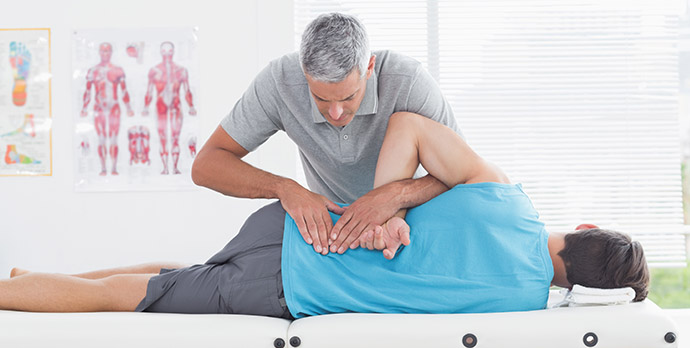
DIPLOMA IN PHYSIOTHERAPY & AYURVEDA (DPA)
By NCTA Team Last Updated: January 27, 2026Overview:
The Diploma in Physiotherapy & Ayurveda is a specialized eleven-month program designed to provide in-depth knowledge and practical skills in both modern physiotherapy and traditional Ayurvedic healing techniques. This course aims to create a holistic approach to pain management, rehabilitation, and overall well-being by integrating evidence-based physiotherapy practices with time-tested Ayurvedic treatments.
Students will learn about human anatomy, biomechanics, and physiotherapy modalities such as electrotherapy, therapeutic exercises, and manual therapy. Alongside these, the course delves into Ayurvedic therapies, including Panchakarma, herbal remedies, Marma therapy, and diet-based healing techniques. The curriculum focuses on treating musculoskeletal disorders, neurological conditions, sports injuries, and chronic pain through a combination of physiotherapy interventions and Ayurvedic methods.
By the end of the program, students will have a strong foundation in both disciplines, allowing them to offer integrated treatment solutions that promote natural healing and long-term health. With a balance of theoretical learning and hands-on practical training, graduates will be well-prepared to work in hospitals, rehabilitation centers, wellness clinics, or even establish their own practice.
Diploma in Physiotherapy & Ayurveda; Mission:
To empower healthcare professionals with the integrated knowledge of Physiotherapy and Ayurveda for holistic healing, rehabilitation, and wellness.
Diploma in Physiotherapy & Ayurveda; Vision:
To be a pioneering program that bridges modern physiotherapy with Ayurveda, fostering a holistic approach to healthcare and rehabilitation.
Course Curriculum:
The curriculum is structured to cover a wide range of subjects, including Anatomy and Physiology, Fundamentals of Physiotherapy, Ayurvedic Pharmacology, and Panchakarma Therapy, ensuring students acquire both theoretical understanding and practical skills. Students will be trained in clinical case management, rehabilitation exercises, and the use of Ayurvedic treatments for holistic wellness. By combining these two fields, the course empowers students to become skilled practitioners capable of addressing both physical rehabilitation and holistic health. Below is the detailed curriculum:
- Anatomy and Physiology:
- Human Anatomy – Study of body systems, bones, muscles, and joints
- Physiology – Functions of organs, nervous system, and biomechanics
- Pathophysiology – Disease mechanisms and their effects on movement
- Introduction to Ayurveda:
- Principles of Ayurveda – Tridosha theory, prakriti (body constitution)
- Ayurvedic Diagnosis – Pulse diagnosis, tongue analysis, and dosha imbalance
- Ayurvedic Lifestyle – Diet, daily routines, and seasonal regimens
- Fundamentals of Physiotherapy:
- Basics of Physiotherapy – History, scope, and importance
- Therapeutic Modalities – Electrotherapy, heat therapy, and hydrotherapy
- Rehabilitation Techniques – Manual therapy, mobility enhancement
- Ayurvedic Pharmacology:
- Herbal Medicine – Ayurvedic medicinal plants and their uses
- Pharmacological Preparations – Oils, balms, and herbal formulations
- Dosage and Administration – Methods of herbal medicine application
- Panchakarma Therapy:
- Detoxification Therapies – Vamana, Virechana, and Basti (therapeutic purgation)
- Rejuvenation Therapies – Abhyanga (massage), Swedana (steam therapy)
- Clinical Panchakarma – Case-based applications and patient management
- Medical and Surgical Conditions:
- Orthopedic Disorders – Fractures, arthritis, and joint dysfunctions
- Neurological Disorders – Stroke, paralysis, and nerve injuries
- Post-Surgical Rehabilitation – Physiotherapy for recovery and mobility
- Exercise Therapy:
- Exercise Physiology – Muscle strength, endurance, and flexibility training
- Therapeutic Exercises – Strengthening, stretching, and balance exercises
- Yoga Therapy – Ayurvedic yoga for rehabilitation and posture correction
- Practical Training:
- Hands-on Physiotherapy – Electrotherapy, manual therapy, and rehabilitation
- Ayurvedic Applications – Herbal medicine preparation and Panchakarma techniques
- Clinical Exposure – Case studies, patient assessments, and project work
Learing Outcomes:
Upon successful completion, graduates will be able to integrate physiotherapy and Ayurvedic treatments to address a wide range of health conditions and improve overall wellness. Students will be able to:
- Understand human anatomy and physiology to comprehend the body’s systems and their impact on health.
- Apply Ayurvedic principles like Tridosha and Prakriti for holistic healthcare.
- Master physiotherapy techniques such as electrotherapy, heat therapy, and manual therapies for effective treatment.
- Implement Panchakarma therapy for detoxification and rejuvenation using Ayurvedic methods.
- Diagnose and manage medical and surgical conditions through physiotherapy and rehabilitation techniques.
- Utilize exercise therapy to improve strength, mobility, and rehabilitation outcomes.
Career Opportunities:
Graduates of the Diploma in Physiotherapy & Ayurveda can explore a wide range of career opportunities in both the physiotherapy and Ayurvedic wellness sectors, including:
- Physiotherapist: Work in hospitals, clinics, rehabilitation centers, or sports clinics, providing therapeutic treatments and rehabilitation programs.
- Ayurvedic Practitioner: Provide Ayurvedic consultations and treatments, including lifestyle recommendations, herbal remedies, and Panchakarma therapies in Ayurvedic centers and wellness clinics.
- Integrative Health Practitioner: Work as a holistic practitioner combining physiotherapy and Ayurveda to offer comprehensive care for physical and mental well-being.
- Sports Physiotherapist: Work with athletes to treat injuries, improve performance, and integrate Ayurvedic methods for faster recovery and enhanced physical health.
- Yoga and Physiotherapy Instructor: Teach therapeutic yoga combined with physiotherapy exercises, promoting physical health, and holistic healing.
- Panchakarma Therapist: Specialize in Panchakarma therapies, offering detoxification and rejuvenation treatments in Ayurvedic wellness centers.
Salary Expectations:
The salary after completing the Diploma in Physiotherapy & Ayurveda can vary based on the type of role, location, level of experience, and the type of establishment. Below are the general salary expectations:
- Entry-level: ₹2,50,000 - ₹4,00,000 per year
- Experienced (3-5 years): ₹4,00,000 - ₹6,00,000 per year
- Senior Physiotherapist/Head of Department: ₹6,00,000 - ₹8,00,000 per year
Course Features
| Course Code | NCTA-348 |
| Duration | 24 MONTHS/1080 HOURS |
| Category | DIPLOMA IN PHYSIOTHERAPY & AYURVEDA (DPA) |
| Eligibility | 10TH PASS/2-10 Year Experience Medical Field |
| Fees | INR(₹) 20000.00/USD($) 255 |
To know more about our this course, feel free to call us at:
+91 9733600770
